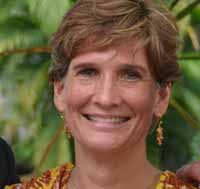Batool Accad was the only one of the five panellists at the workshop wearing a hijab: coral pink from head to toe that drew attention to her gentle face and striking grey eyes.
Though born in Syria, she grew up in Kuwait. Her parents were members of the well-educated Middle Eastern expatriate community giving her a cosmopolitan and international worldview. She married directly after high school and moved directly as an expat to Nigeria where she has lived her entire adult life.
The workshop, called What’s in it for Me?, was designed to help globally mobile women identify professional (whether paid or volunteer) activities in Lagos that contribute to their long-term personal goals.Batool had rather reluctantly agreed to speak: she doubted that her accomplishments lived up to the criteria of being something valuable done during her time in Lagos. I begged to differ.
She began her presentation by apologising for her limited experience and lack of confidence in public speaking. But within minutes, her story had the audience riveted.
‘When I first joined Small World, I met a woman who refused to speak with me,’ Batool said.
In 2011, once her children were in secondary school giving her some amount of free time from motherhood, she joined the charity committee of Small World, the international community’s yearly fundraising programme in Lagos. This was her first professional experience in any capacity since her graduation from high school more than two decades earlier. In the beginning, she had had to overcome personal insecurities: one of these was dealing with negative stereotypes of veiled Muslim women.
‘This woman said that as far as she was concerned, any woman who is covered is a terrorist.’
Luckily Batool was not daunted by this woman’s fear: over the year they were slowly able to get to know the individual underneath the other’s exterior and are now good friends.
Working for Small World is like participating in the United Nations. The event is run entirely by volunteers: nationally-based women’s groups (representing over 30 countries or regions) prepare musical performances and manage food stalls for this outdoor festival that hosts 3000 guests. The funds raised through ticket sales and advertising are distributed to one of the carefully selected local charities. In its 20 years of activity, Small World has raised over N300 million (nearly 1.5 million Euro) use to support over 150 Nigerian organisations.
Members of the Executive Committee recognised that there was more to Batool than even she was aware of. In 2012 she was asked to be the Vice-Chair of the event and the following year she chaired the entire programme – the first Muslim woman to manage this bulky, multinational organisation.
The set of skills required to organise and motivate multiple teams of volunteers from many cultures around the world is impressive: organisation and planning, cross-cultural sensitivity, heaps of determination, passion and flexibility, patience and respect for the points-of view of others. It really doesn’t matter that these jobs are un-paid: the quality of the event and the impact of the charitable donations are examples of top-level professionalism, very hard work and dedication to laudable ideals.
It was this success that had earned her a place on the panel. But as it turns out, this experience wasn’t the most interesting part of her presentation.
Batool told the story of how, in the 1990s, she and her (then new) husband drove to Ubudu Cattle Ranch, a cool, stone-built mountain resort in south eastern Nigeria. Their driver stopped to ask for directions in the market of a typically nameless village split in half by the “highway”, a narrow, potholed road that criss crosses the country. In the sandy verge, a young woman wearing a brightly coloured ankara wrap sold food from a large platter balanced on her head. When this girl noticed the white faces seated in the back of the car, she threw her platter to the ground and ran screaming into the web of shacks beyond the marketplace. Perplexed, the driver asked villagers what the problem was. It turned out that the girl’s sister had, only weeks earlier, been forced into a car with white people, and disappeared – rumour had it that she had been sold into slavery or the sex trade.
‘I was shocked by this story and knew that I had to do something. I know I can give to charities back home in Syria – of course they can use it – but I have what I have in my life because of my husband’s job in Nigeria, so it’s important for me to give back to the people of this country.’
What struck the participants at the workshop was that, more than anything, Batool is an example of how we are each responsible for creating the world we want to live in, one friendship at a time.
‘For me, Small World gave me the confidence to know that I can do something with my life. I regret that I did not continue my education after high school. Now that my kids are nearly independent, I want to change that. Maybe one day I can defend the rights of Muslim women against injustice.’
Whether we volunteer or have paid employment, international women like Batool are the pillars that strengthen the delicate fabric of our global, multi-cultural society.
Diane Lemieux was born in Quebec and moved to live abroad for the first time at the age of three. That journey continued through 11 countries on five continents during which she collected 4 languages, two passports and several cultural identities. She started her career in international development but decided over 15 years ago to raise her two children and pursue her passion: writing. Today, she is author of four books including The Mobile Life: a new approach to moving anywhere and Culture Smart! Nigeria. For more information see her portfolio: www.diane-lemieux.com or blog: diane-lemieux.com/mobilelife

